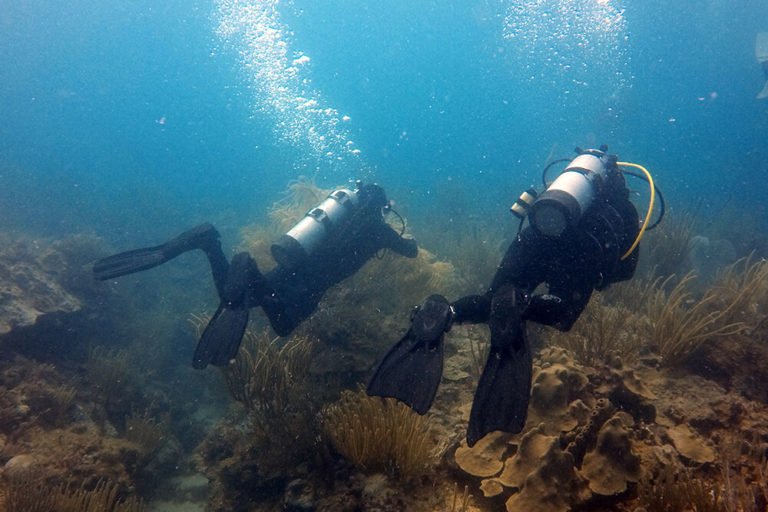How to Deal with a Panicked Scuba Diver

As magical as scuba diving can be, it can also cause anxiety, even in the most experienced divers. Factors such as poor visibility, high currents, threatening marine life or even losing a buddy can cause panic. This anxiety can make divers forget their training and act in irrational ways that bring harm to themselves and the divers around them. By knowing what to do if your diving companion panics, you can help keep things under control and enjoy your dive safely. Here’s what to do:
KNOW THE SIGNS
One of the best ways to help a panicked diver is to prevent the panic from happening in the first place. There are often subtle signs of anxiety in a diver that will alert others to their fear, such as:
-
Fiddling too much with equipment
-
A blank stare once underwater
-
Uneven breathing
-
A lack of response to simple hand signals
If you notice any of these signs, you should attempt to calm the diver down using the following techniques.
APPROACH CAREFULLY
It’s important that you don’t bolt over to the diver for two reasons. One, you don’t want to alarm or agitate them further. Two, you need to keep yourself safe. Panicked divers are often so blinded by fear that they may grab for your air supply or latch onto you, rendering you unable to swim or ascend properly. Whenever assisting a panicked diver, you should use caution when approaching and try to keep a safe distance (about arm’s length) between you.
EXUDE CONFIDENCE
One of the most effective ways to get another diver to calm down is to remain calm yourself. Confidence is key when dealing with a panicked diver, as it establishes a level of trust. If they see you start to panic, it’ll only make matters worse. Instead, firmly grip their arm or shoulder and maintain steady eye contact that lets them know they’re okay. Sometimes this simple, reassuring gesture is all it takes to get a diver thinking clearly again.
BALANCE BREATHING
When anxiety strikes, one of the first bodily functions it impacts is breathing. Panic attacks cause shallow, uneven breathing, which prolongs panic and creates a suffocating sensation. For this reason, it’s important to get the anxious diver breathing normally again as quickly as possible. To accomplish this, motion to them to take deep belly breaths. You should breathe with them to set the pace for slow breathing, since big, fast breaths can cause lightheadedness.
ASSIST THEIR ASCENT
If the diver cannot regain control of their emotions, it’s vital that they head back to the surface. But beware—panicked divers have a tendency to bolt to the surface, causing decompression illness. You can help them to make a safe ascent by swimming behind the diver and grabbing ahold of their tank valve. Make sure everything is in place and assist them to make a slow, safe ascent. If they resist you or force you both to ascend too quickly, do not put yourself at risk. Let go and back away.
CONCLUSION
Dealing with panicked divers can be a scary situation for everyone. But remembering these simple tips, as well as your diving training, will help you to keep everyone as calm and safe as possible. Just remember—you should never put yourself in harm’s way to assist a panicked diver. If they are struggling against you, it’s always best to step back and keep yourself safe!
